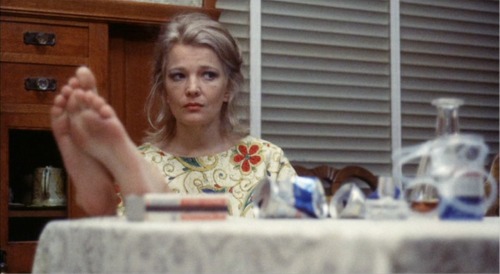Revelations.
Ingmar Bergman, bar none one of the best filmmakers who have ever lived, has just proved here in "Through a Glass Darkly" that one does not need a complex set-up to convey something powerfully meditative. Merely utilizing the sterile landscapes of the island of Faro in Sweden, he, with the aid of the more than able hands of legendary cinematographer and frequent collaborator Sven Nykvist, has made a film that deeply questions religion yet also explores the painful beauty (yes, you read that right) of insanity.
If John Cassavetes' 1974 film "A Woman Under the Influence" has presented insanity as something akin to a suburban necessity by showing how it can keep a family together in the most trying of times, "Through a Glass Darkly" depicts it as something that seems to border on the artistic. Bergman, by equal amounts probing and observant in his approach, portrays insanity not as a terrible mental disease but as a symphonic descent into the unknown. This, I think, is the only film that I have seen concerning mental illness in which I do not really pity the character's psychological condition but instead, in a strangely perverse way, envies it. What is she seeing that we don't?
The film, a true landmark in simple yet reflective storytelling, is about a small family living on a quiet island and how their lives and own states of mind are being drastically affected by the only woman in the family's troubling mental health. Her name is Karin (Harriet Andersson), daughter to Martin (Gunnar Björnstrand), sister to Minus (Lars Passgård) and wife to Martin (Max Von Sydow). At times a seemingly naïve lass but more often a behaviorally mercurial woman who, as if summoned by a mysterious voice, waits so eagerly for the arrival of what he thinks is 'God' himself, her unpredictability causes general alarm to the family members. What is it that she is waiting for that they are all oblivious about?
Through this simple dichotomy of insanity and the otherwise, Bergman is able to construct, in true auteur fashion, a philosophical statement about both the futility of religion and the intrinsic role of love in human existence.
"Through a Glass Darkly", though not necessarily a film that's conspicuous in its optimism, still offers a subtly positive outlook. Despite of the film's increasingly despairing situation as Karin careens into psychological oblivion and as she finally finds out the true, beastly nature of the 'God' whose arrival she so patiently awaits, "Through a Glass Darkly" was still able to find light by utilizing some logical fallacies that solidifies Bergman's faith in human faith itself.
There's this scene in the end where Minus and his father David, while contemplating Karin's fate, unexpectedly swerves into a melancholic conversation about the true connection between 'God' and 'love'. David, the classic image of a jaded yet hopeful human being, blurts out his belief that God and love is the same thing, and being equipped with that comforting idea makes him feel less empty inside.
But with that, Minus, on the other hand the classic image of a naïvely confused young man, asks his father back that if God is love, then Karin, his mentally unstable sister, is surrounded by God because they all love her so much. With that thought, Minus then asks his father: "Can that help her?" (pertaining to Karin's condition)
Bergman, at that moment the classic representation of an artist questioning the extent of God's power, initially may have intended to leave some of the film's doors relatively open. It could have ended right at that very moment but Bergman, immediately shifting gears from skepticism to enlightened assurance, made the father answer his son with the line "I believe so".
With that dialogue, Bergman seems to put his own way of religious thinking in perspective. Not that sure, not that certain, but definitely adhering to some kind of light and hope, that line highlights what "Through a Glass Darkly", at least for me, is all about. Despite of Karin's description of the 'God' that she has seen as something akin to a monstrous spider, David, with his final answer to Minus' inquiry about the whole 'God is love' thing, is a testament of faith, however futile, amid weighing questions. "Through a Glass Darkly", religious-wise, is a film that raises doubts yet also enlightens. Only a few filmmakers can do that. Well, maybe only Ingmar Bergman can.
FINAL RATING







